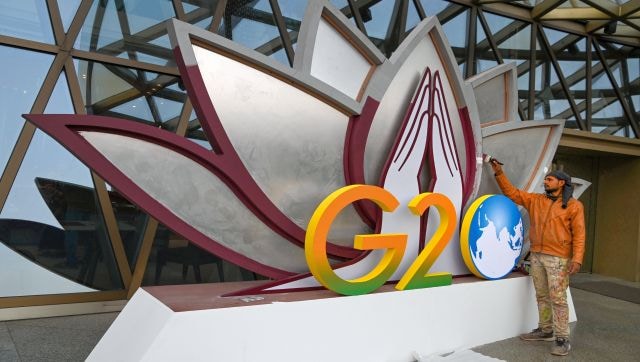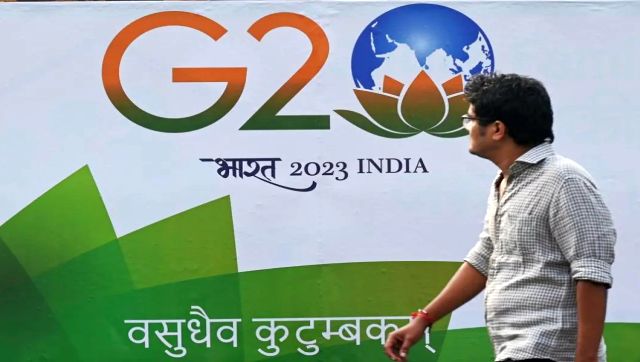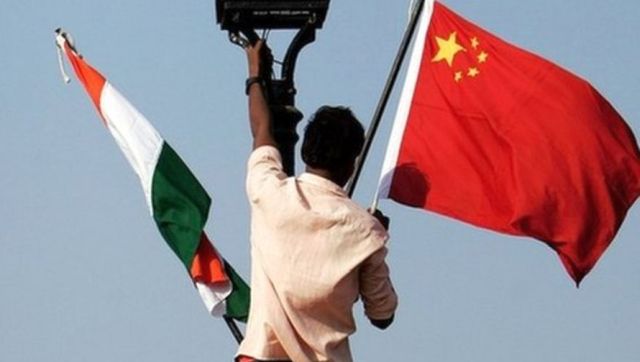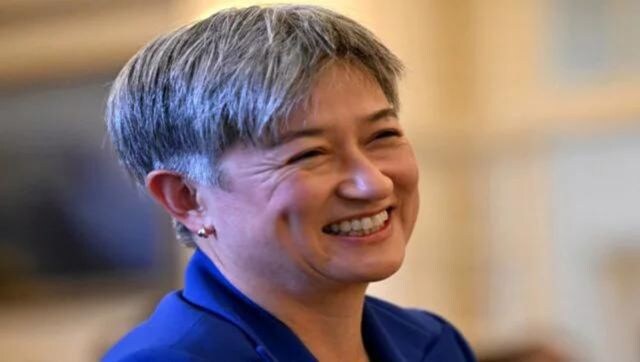Why India’s G20 theme of ‘Vasudhaiva Kutumbakam’ has made China see red
China is playing spoilsport during India’s G20 presidency and has raised objections to the theme of ‘Vasudhaiva Kutumbakam’. Beijing argues that G20 documents could not use the term in official text as it is in Sanskrit, which is not one of the six official languages recognised by the United Nations

Sand artist Sudarshan Pattnaik creates sand art on G20: India 2023, at Puri beach. China has objected to the Sanskrit phrase Vasudhaiva Kutumbakam, stating that it is not among the six recognised languages of the United Nations. File image/PTI

India has assumed presidency of the all-important G20 bloc and is busy hosting meeting after meeting as part of their duties. As host nation, India is ensuring that it leaves no stone unturned for this momentous opportunity.
As part of its presidency, India had earlier announced its theme and logo. For its theme, India adopted “Vasudhaiva Kutumbakam” or “One Earth • One Family • One Future”. However, according to a latest report, China has opposed the Sanskrit phrase and asked that official documents and letters don’t carry it.
Let’s take a closer look at the language row and why China is unhappy about the G20 theme.
Related Articles
China irked by ‘Vasudhaiva Kutumbakam’
As per a report in The Economic Times, China has voiced it opposition to the phrase and its use in the official documents during last month’s G20 Energy Ministerial Meeting as well as several other similar G20 documents.
The opposition from the Chinese side stemmed from the fact that the phrase – Vasudhaiva Kutumbakam’ – was Sanskrit, which is not one of the six officials languages recognised by the United Nations. The six official languages of the UN are Arabic, Chinese, English, French, Russian and Spanish.
China’s opposition to the addition of the phrase in the G20 documents continued even though other participating nations lent its support to India, and some even observing that the theme was the prerogative of the Presidency and host nation.

Eventually, the final G20 document – Outcome Document and Chair’s Summary for Energy transition, only carried the English translation of the concept of Vasudhaiva Kutumbakam but was retained in the logo/letterhead of each document.
It read: “We, the G20 Energy Ministers, met under India’s G20 Presidency, with the theme ‘One Earth, One Family, One Future’ in Goa, India, on 22 July 2023.”
And it’s not just the energy meeting document that has dropped the Sanskrit phrase. A majority of the Outcome documents so far, including the finance ministers meeting, the education ministers meet, the tourism, environment and labour and unemployment, all mention ‘One Earth, One Family, One Future’ as the Indian presidency’s theme in the official text, skipping the phrase ‘Vasudhaiva Kutumbakam’.
As per the Economic Times report, only the foreign minister’ Outcome document carries the Sanskrit phrase.
The Ministry of External Affairs is yet to officially comment on the issue.
The meaning behind the G20 maxim
Prior to India assuming the presidency of the G20 in December last year, Prime Minister Narendra Modi had announced that India’s theme would be grounded in ‘Vasudhaiva Kutumbakam’.
‘Vasudhaiva Kutumbakam’ is drawn from the ancient Sanskrit text of the Maha Upanishad. The theme affirms the value of all life – human, animal, plant, and microorganisms – and their interconnectedness on the planet Earth and in the wider universe.
In fact, Dr Jitendra Singh during the G20 Tourism Working Group Meeting in Srinagar had said that the theme of India’s G20 presidency conveys the powerful message, which is of striving for just and equitable growth for all in the world.
As the website Civil20 explains, “Vasudhaiva Kutumbakam can be considered as a universal maxim whose purpose is not imposition, but to enable mutual respect and evolve human consciousness and society. It is the most practical way to ‘Recover Together, Recover Stronger’ as expressed by the G20 Indonesia 2022. It helps us move from an “I-Them” approach to an “I-We” approach. It also fosters a Dharma-based society where the strong protects the weak, where giving precedes taking and where rights and responsibilities are synchronous,” the website states.

When China has had objections earlier too
This, unsurprisingly, isn’t the first time that Beijing has voiced an opposition during India’s G20 presidency. Earlier in May, China opposed to India holding its G20 tourism working group meeting in Kashmir, saying it is free to hold meetings on its own territory.
Beijing even skipped the meeting held from 22 to 24 May, citing its opposition “to holding any kind of G20 meetings in disputed territory,” according to Foreign Ministry spokesperson Wang Wenbin. However, New Delhi remained resolute and in response had said, “The Union Territory of Jammu & Kashmir and the Union Territory of Ladakh are and always will be integral and inalienable parts of India. No other country has a locus standi to comment on the same.”
Catch Firstpost’s full coverage of India’s G20 presidency
Will Vladimir Putin visit India for G20 summit?
India’s G20 presidency crosses the halfway mark: How has it fared so far?
What is G21? Why has PM Modi been pushing for it?
Why India’s G20 presidency is significant
Interestingly, Pakistan, who is not a member of the G20 and has close ties to China, had also raised objections to India hosting an international event in Srinagar.
Along with China, Turkey, Saudi Arabia, Egypt and Indonesia also stayed away from the Jammu and Kashmir meeting. However, China’s plan to stymie India didn’t work and the meeting witnessed the participation of over 60 invitees from member countries.

India-China and the G20
New Delhi and Beijing have had frosty ties since 2020 with the two countries being locked in a military standoff at various sections of the Line of Actual Control (LAC) which began with the deadly clash at Galwan Valley in May of that year.
It is in light of these strained relations that India assumed presidency of the G20. Since then, the Chinese have been quite focused on India taking over the G20 presidency. Some media in China report that the G20 presidency could help thrust India into the great power club and set the nation on the course to join the coveted UN Security Council as a permanent member.
That is naturally not something that Beijing would be approving of.
Some Beijing commentators have also noted that Beijing holds the card if New Delhi wants to make an impact with its G20 presidency. As Dingqing Focus, a new media account affiliated with National Defence Times, wrote: “All countries know that a G20 Summit without China’s participation cannot be considered a success… Because if China does not participate, a lot of topics simply can’t be discussed. The second India’s important neighbours are not present, it is inevitable that the international community will also question its influence.”
With inputs from agencies
also read

Strongly support India's G20 presidency: Australia's foreign minister
Penny Wong will be in Delhi to attend the G20 foreign ministers' meet on March 1 and 2 as well as to participate in the Raisina Dialogue, India's premier conference on geopolitics and geoeconomics

Uncertainties cloud global economy, G20 nations must resolutely address challenges: RBI Governor
Shaktikanta Das said although the outlook for the global economy has improved in recent months and there is now greater optimism that the world may avoid a deep recession and only experience slow growth or softer recession,'yet uncertainties lie ahead of us'

'India to put across concerns of Global South at G20 platform'
The G20 Summit will be held in New Delhi on September 9-10 this year


